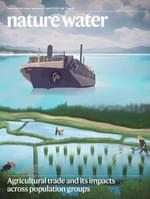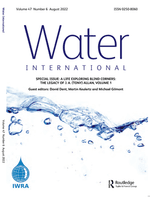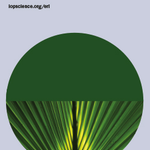How researchers aimed to meet resource challenges that transcended boundaries
The Oxford Martin Programme on
Transboundary Resource Management
The Transboundary Resource Management programme ran from 2018 - 2023. The following page is an archived resource.
The Challenge
Climate change and resource scarcity threaten the well-being of millions of people around the world. In regions where vital natural resources - such as rivers - span political borders, these threats can be exacerbated by political disputes and lack of trust.
For example, environmental stress, climate change and the mismanagement of natural resources are claimed to have worsened the humanitarian crisis in Syria, contributing to regional destabilisation and protracted conflict.
The prevailing approach to meeting water and energy needs focuses on sector-based supply-side solutions, which combine with politically-charged narratives of national self-sufficiency.
This approach ignores both the cross-border nature of many natural resources and their strong interdependence: energy is critical for water supply, water is needed in power generation, and both resources are essential for food production.
This programme will promote practical cross-border co-operation on natural resources in the eastern Nile Basin and the Jordan River Basin. We will analyse the interconnections between water, energy and climate in these regions and produce scenarios of future needs, trajectories for resource governance and infrastructure development.
We will also approach the issue practically by working to support a multi-track and iterative process of exploring potential solutions across each region. This will engage a wide range of stakeholders, including local interest groups, academic institutions, government researchers, and private citizens to discuss and collaborate on regional water and energy policies. This multi-track process will seek to build trust and an understanding of the priorities and concerns of each group sharing the natural resources in question, leading towards a set of politically acceptable regional approaches that address critical resource challenges. Approaches co-created with a wide array of stakeholders will provide potential solutions that governments can consider in formal negotiation processes.
We aim to contribute to resolving transboundary resource conflict in the Middle East and North Africa through practical and inclusive means. If successful, this would provide a new basis to resolve seemingly intractable challenges that threaten the achievement of the SDGs in the region.
News and Blogs
View allSetting the record straight on the impacts of the Grand Ethiopian Renaissance Dam (GERD)
Current policies cannot stabilise the Colorado River in face of ongoing megadrought
Filling the Grand Ethiopian Renaissance Dam is unlikely to significantly affect Egypt, but coordinated drought planning is essential
How Natural Resource (Mis-)management in the Nile River Basin May Threaten Stability
Professor Steve Rayner announced as 2020 Paradigm Award winner
publications
View all
Energy trade is the future of water management for the Nile

Basin-wide knowledge exchange for the sustainable management of the Colorado River

Toward a Typology of Environmental Cooperation in Postconflict Settings: The Case of Jordan and Israel

Drivers and impacts of Eastern African rainfall variability

Comment on 'Egypt's water budget deficit and suggested mitigation policies for the Grand Ethiopian Renaissance Dam filling scenarios'

Beyond barriers: the fluid roles young people adopt in water conflict and cooperation

Water research and nationalism in the post-truth era

Proposal for a roadmap for storing energy in Israel in order to meet the renewable energy targets- Hebrew
In the press
Trailblazing models show green windfall from Israel-Jordan-PA water, energy alliance
In the “Water and Peace” dialogues, does water become a tool for peace?
The Glasgow Conference, COP26 Last Call for the Well-Being of Humanity
Webinar hears of ‘politics of water scarcity’ in region
Africa’s largest dam powers dreams of prosperity in Ethiopia — and fears of hunger in Egypt
Ethiopia denies damming the Nile as conflict looms in Africa
Satellite images show Ethiopia dam reservoir swelling
Towards a Green New Deal in Palestine
Transboundary water relations in post-conflict Syria
Row over Africa's largest dam in danger of escalating, warn scientists
Keep in touch
If you found this page useful, sign up to our monthly digest of the latest news and events
Subscribe